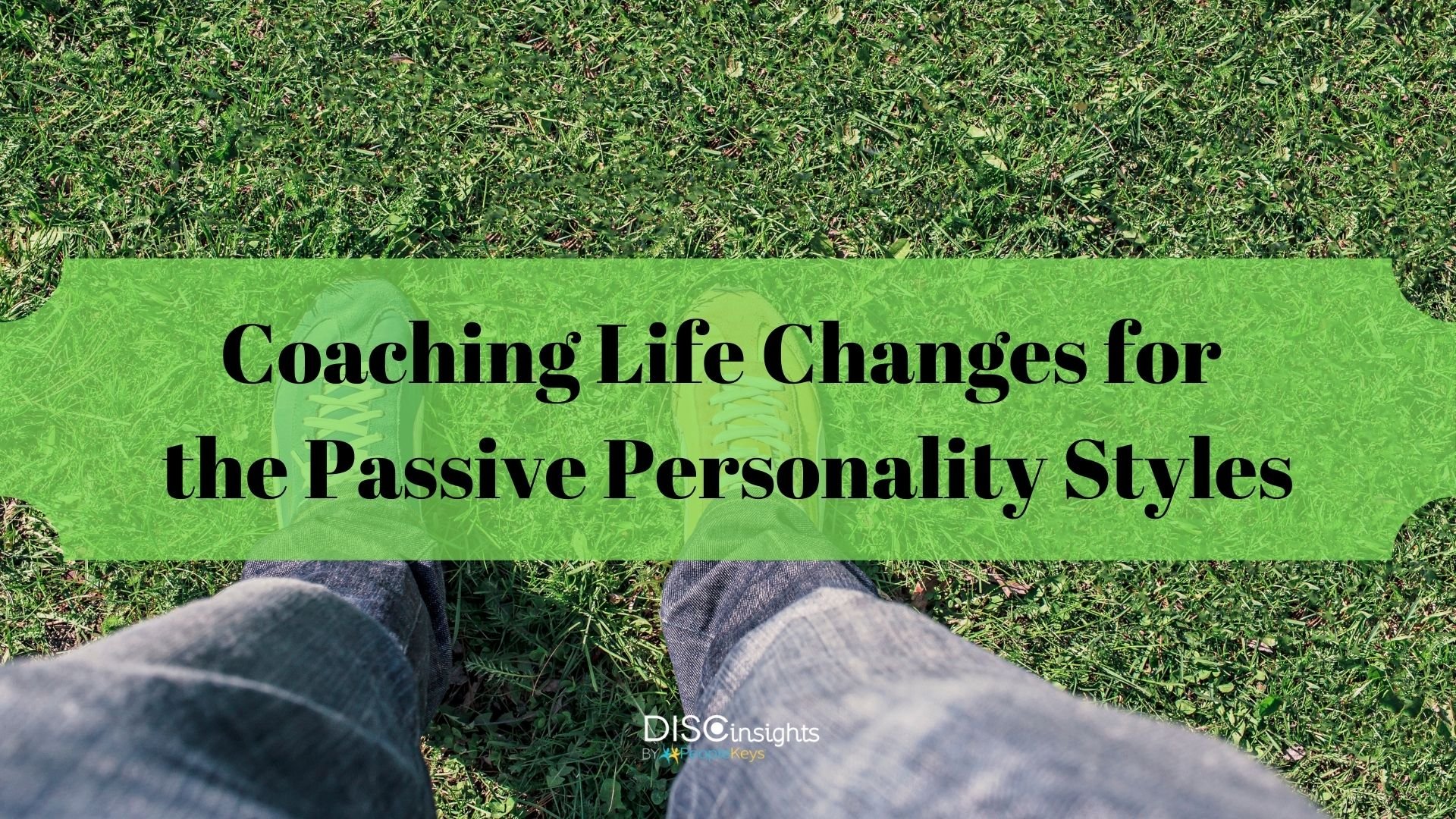- SHOP BY PRODUCT
- DISC TRAINING & CERTIFICATION TOOLS
- DISC RESOURCES
- BLOG
- SHOP BY PRODUCT
- DISC TRAINING & CERTIFICATION TOOLS
- DISC RESOURCES
- BLOG
- ALL ITEMS



When it comes to dealing with stress, change and volatile situations, understanding DISC personality styles and communicating change in the proper way is always necessary. When you coach against life changes, a behavioral approach not only builds trust amongst all involved, but it allows each personality to contribute without the fear of conflict or confrontation. As we previously discussed in our blog about coaching life changes for the active personality styles, according to DISC theory personality styles can be separated into Active and Passive styles. The active “D” and “I” styles tend to react quickly to challenges and being stagnant drives them crazy. At the same time – the passive styles – “C” and “S” are more reserved and slower to accept change. Your main task as a life coach will be to help them understand that sometimes taking too much time to process an idea can become detrimental to progress and counterproductive to the situation. See more life coaching tips below.

As a life coach, you must know a large majority of people have a prevailing “S” personality style, and the need for security drives this personality internally. Any loss of status quo instinctively makes them avoid confrontation (and reality) and pushes them away from dealing with a situation directly. In short, they are people-oriented and can be sympathetic and caring to others while helping them solve their problems. However, they are less sympathetic to their own chaos and tend to clam up or run in the other direction when the time comes for them to face their own challenges.
As a life coach working with an “S” style, you will need to take the process slowly. They require time to adjust to change, and often save-up both energy and finances to deal with potential problems faced down the road. The problem is money can’t solve everything, and time isn’t always on our side. While these characteristics help them prevent situations from occurring to begin with, they can’t resolve every situation – and, this is where chaos ensues.
Openly agreeable and inwardly unyielding, an “S” should learn to adopt some “D” and “I” characteristics during times of change and stress within their immediate environment. If not, they should recruit “D” or “I” style family members to support their transition, and help them to find solutions and stay positive. Because they tend to be people-oriented, “S” personalities will find teamwork beneficial to deal with each new problem systematically. Help your “S” style client to open-up and not be afraid to share any concern or feedback along the way. They may actually realize they have the best chance at conquering every obstacle that stands in their way, while taking advantage of every opportunity that materializes in their presence.
When working with a “C” style, have in mind they fear criticism and may shut down automatically when faced with immediate conflict or change they are not prepared for. Use their strength of analytical skills and discuss their goals. Have in mind, “Cs” tend to keep looking in the past so any changes outside of their comfort zone and not within their personal areas of expertise can cause major disruption to their progress. Your main coaching task will be helping them to keep looking forward.
Similar to “Ds”, the “C” style personalities are task-oriented, however, they seek both safety and security within the process. Make sure you provide them a very detailed step-by-step plan and assure them there is always a plan B, or even a plan C, for any situation they may come across. Remember that “C” styles need stability and the ability to predict the future based on data and facts. They are practical, and rely on existing systems to help them maneuver anything that stands in their way of reaching their goals. They excel when tasks can be completed one at a time. They need to analyze risks and safeguard the process before things start getting out of hand. They need to avoid postponing decisions in order to avoid being too bogged down under time constraints.
Planning well in advance with your “C” client will help them troubleshoot situations as they occur, and find the shortcuts necessary to get through circumstances independently without the risk of shutting down or getting bogged down with details. You, as their life coach, will need to help them see the bigger picture so there are no surprises on their path to progress. “C” personalities don’t often find themselves in overly problematic situations, as they are cautious, detail-oriented and perfectionistic by nature.
Many people associate DISC only with the business world, but DISC can be applied to every aspect of life and your coaching practice. Become a certified DISC life coach and an expert in understanding how you can help different personality styles adapt to new situations and face challenges head-on. Click here to start your new journey of supporting people today!
Check also Coaching life changes for the active personality styles.

© PeopleKeys. All Rights Reserved
WORKING DAYS/HOURS
Mon - Fri / 8:30AM - 5:00PM EST
